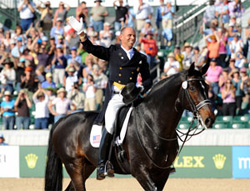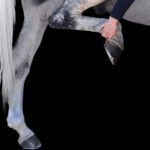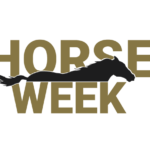September 28, 2010 — There was a time when the U.S. generally could be counted on to win the team bronze at the World Equestrian Games and Olympics, while the Germans were perennial gold medalists.

Times have changed. Today the Germans–who won every team world championship since the event began in 1966–are no longer the powerhouse of old. With a squad of two newcomers and two experienced riders, Matthias Rath and multi-Olympic medalist Isabell Werth, they were lucky to edge the Americans for the bronze, earning 220.595 percentage points to 218.128. The Dutch, as expected, won the gold for the first time, taking the title with 229.745 points despite the jarring elimination of Adelinde Cornelissen after a judge spotted blood in her horse’s mouth (see related article.) But a strong effort from Imke Schellekens-Bartels with Hunter Douglas Sunrise and Hans Peter Minderhoud on Exquis Nadine bolstered the 84.043 percent score earned by Netherlands’ anchorman Edward Gal with a precise ride on Moorlands Totilas. And freestyle world champion Anky van Grunsven wasn’t even on the team, confining her participation in this WEG to the reining arena. How times have changed!
Great Britain (224.767) rose to silver with a huge effort by Laura Bechtolsheimer and Mistral Hojris (82.511). I had never seen this sturdy chestnut or Totillas in person, but I was as impressed by Laura’s horse as I was by the legendary black stallion, who had the crowd on its feet applauding after his performance.
As I watched Mistral Hojris doing the things that make grand prix grand prix, I said to myself, “Now that’s a piaffe; now that’s a passage.” It was textbook, and he got a 10 for his centerline conclusion from the head of the ground jury, Stephen Clarke.

There was a time that Great Britain was as well known for its dressage as it was for its food, if you know what I mean. But its cuisine has gotten more sophisticated and so has its dressage. I wondered if Laura had an inkling how things would turn out this afternoon as the sparkling weather put a patina on her lovely ride.
But it wasn’t all bad news for the U.S. The fourth-place finish qualified our team for the 2012 Olympics in Great Britain, taking a load off everyone involved, from technical advisor Anne Gribbons to chef d’equipe Eva Salomon and Jim Wolf, the U.S. Equestrian Federation executive director of sports programs.
I asked Jim for his assessment.

Qualifying for the Olympics means the U.S. won’t have to use as many resources on the Intermediare I group in the run-up to next year’s Pan American Games, which would have been America’s other chance to qualify. The Pan Ams are run at Prix St. Georges/I-1 level, so now more attention can be paid to grooming the Grand Prix candidates for 2012.
The only veteran on the U.S. squad was Steffen Peters, who had a lot of ground to make up with Ravel after none of his teammates broke 70 percent. He did his best to be marked at 78.596 percent, putting him third individually in the Grand Prix. Steffen had some terrific moments, including a canter extension that earned him a 10.
Here’s how he looked at his test.

Steffen got practically the same type of reception as Edward Gal, or should I say, Totilas. It amazed me how the covered stand filled up when it was time for the big stars to appear. This is a very astute crowd, and quite nationalistic, too. Patches of orange (the Dutch), a bevy of American flags and Union Jacks were prominent in the stands when it came time for their favorite sons and daughters to appear.
I should advise you that today’s action only qualified 31 riders for tomorrow’s Grand Prix Special, where everyone involved starts all over again with a blank slate. Still, I expect Steffen to stay ahead of Isabell, whose Warum Nicht looked lackluster in the piaffe, without the power that won the World Cup finals in 2007. Her score was 75.404. I don’t think any but the top four will threaten for individual medals (the freestyle is contested Friday night) though I was very surprised at the energetic performance (done to appropriate Spanish music with castenets) of Spain’s Juan Manual Munoz Diaz on the gray Spanish stallion Fuego XII. Fuego means fire in Spanish, and this horse and rider had plenty of it. They finished fifth with an impressive 73.957 percent.
A note about the music: It plays softly in the background (this isn’t the freestyle) but it’s always appropriate. For instance, the Ascot race music from “My Fair Lady” was on for Tina Konyot, whose boyfriend, Roger Attfield, is a racehorse trainer. Subtle and very inside baseball (or inside dressage) but a lot of fun. Tina and Calecto V had some mistakes, including a break from the trot to the canter near the beginning of the test and a freeze in the final piaffe when she failed to put her legs on him, so she was kicking herself. But she and teammate Katherine Bateson-Chandler have another chance to prove themselves in the Special. Todd Flettrich, who had the drop score with Otto, did not qualify for the Special.
By the way, judge Stephen praised the historic quality of the competition and the horses.
“The level is fantastic,” he said.
“They all really took high risk and made it exciting for the public.”

It was great to see Courtney King Dye on hand for today’s action. She’s made such great progress since her life-threatening fall and coma in Florida last winter.
She eagerly watched the rides and when it came time for Steffen to appear, she was enfolded by the American contingent that gathered in the ring in what some call the “kiss and cry” area. I asked what she thought of the performances, and she simply replied, “beautiful.” Her eyes were filled with joy that let us know she doesn’t take anything for granted anymore, and appreciates every minute that she can be around horses and her friends.
Tomorrow I’ll be back with a report on the Grand Prix Special. Interesting to see whether Mistral Hojris can take the measure of Totilas, and whether Steffen can move up.
Until then,

Visit EquiSearch.com’s World Equestrian Games headquarters for news, blogs, photo galleries and more!





